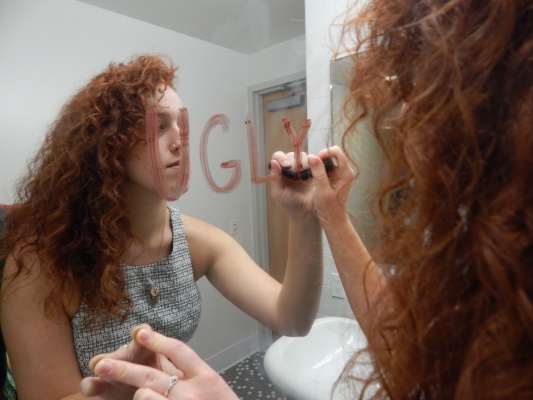#StopMakeupShaming
Makeup should be seen as something artistic and creative, not something to condemn. PHOTO BY: LYDIA BENNER / THE OBSERVER
October 1, 2015
It’s as simple as this: some girls wear makeup and some don’t. A common misconception about girls who wear makeup is that they do so solely because they are insecure or looking for attention. In reality, many girls choose to wear makeup for one person—themselves. Online blogger, Brandon Gaille, collected statistics about makeup and shared that a recent study shows 82 percent of women believe that wearing makeup makes them feel more self-confident. Makeup shaming attacks women for the amount of makeup they choose to wear and their reasons for doing so.
Katelyn Malanowski, Fordham College at Lincoln Center (FCLC) ’19, has done makeup for theatre shows since middle school and is, in general, a makeup enthusiast. Sephora is her candy store. “It’s art on your face,” she said “You can change it up based on your mood on any given day.” Like decorating a room, it is a form of creativity and expression.
Malanowski has never experienced makeup shaming personally, but she is bothered by the stigma attached to wearing makeup. She believes that “it shouldn’t be an issue—especially when people say it’s about guys. It has nothing to do with impressing boys. I wear makeup because it makes me feel more confident and put together, and I enjoy putting it on.” Malanowski, like many others, makes the conscious choice to wear makeup because she knows it will make her feel good. This is a sign of security and self-acceptance, not insecurity.
James Linacre, FCLC ’19, brings up the invalidity of the argument that those who wear makeup are “falsifying” their look. He said, “There’s not much more authentic than showing the artistic expression and interpretation of a person’s feelings through makeup, as it’s so visibly on display for the world to…appreciate.”
Though it has been prevalent in society for quite some time, the issue of makeup shaming had never been addressed with as much force as it is now until a YouTube user by the name of NikkieTutorials uploaded a video about it in May of this year. In the video, she puts makeup on only half of her face and leaves the other half bare, embracing her beauty both with and without it. This video, which received more than 22 million views, inspired many women to post pictures of half made-up faces and embrace their love for makeup.
As a reaction to this video, the blog “Shedding Of The Ego: Exploring the Male Mind.” which is primarily rooted in anti-feminist (possibly anti-women) thinking, published a strongly worded post belittling the value of women speaking out toward this issue. The writer asserts that “western civilization has become so ridiculously safe for women…that they have to invent various methods by which they are oppressed out of thin air.” Quite frankly, thinking like this is exactly why shaming and judging in general needs to be put to a stop. Nobody is asserting that they are “oppressed,” just that they would like to stop being judged for personal choices they make.
Nora Wheelehan, FCLC ’19, enjoys makeup because she likes “being able to play with [her] features.” She said, “I like to wear it just because I like the look of it. It’s just fun.” Wheelehan has witnessed makeup shaming in the past. She said, “My school…was an all girls boarding school so we were all really comfortable with each other…so no one wore makeup, [but]…some people were rude to people who did wear makeup to school because they were like, ‘Why are you doing this? Who are you trying to impress?’”
Makeup shaming is also a feminist issue. It is no secret that girls are constantly under a microscope when it comes to their appearances. “There are a lot of guys who spend a good amount of time getting ready and no one would say anything about that,” argued Malanowski. Makeup shaming can include shaming girls who choose not to wear makeup, which is equally not okay.
Essentially, people always seem to find new and unnecessary methods to judge each other. Wearing makeup is just another way to contribute to one’s aesthetic, like accessorizing. Linacre noted that it “is really no different than picking out an outfit in the morning. The [person] chooses whatever makes them feel best at that moment.”
Malanowski added, “Nobody asks ‘why does she always curl her hair?’ or ‘Why does she wear dresses every day?’”
Despite all of this, one cannot ignore the progress society has made. Body positivity and acceptance are growing trends, but people fail to realize that makeup shaming, like fat shaming or any other type of shaming, negatively contributes to one’s body image.
Judging anyone about the motivation behind their personal choices hinders the possibility of a society free of judgment.










